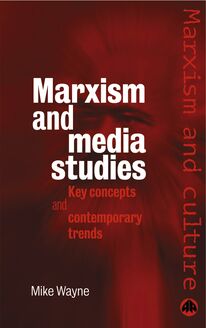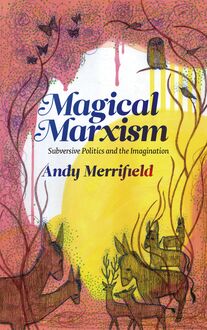-
 Univers
Univers
-
 Ebooks
Ebooks
-
 Livres audio
Livres audio
-
 Presse
Presse
-
 Podcasts
Podcasts
-
 BD
BD
-
 Documents
Documents
-
- Cours
- Révisions
- Ressources pédagogiques
- Sciences de l’éducation
- Manuels scolaires
- Langues
- Travaux de classe
- Annales de BEP
- Etudes supérieures
- Maternelle et primaire
- Fiches de lecture
- Orientation scolaire
- Méthodologie
- Corrigés de devoir
- Annales d’examens et concours
- Annales du bac
- Annales du brevet
- Rapports de stage
La lecture à portée de main
Vous pourrez modifier la taille du texte de cet ouvrage
Découvre YouScribe en t'inscrivant gratuitement
Je m'inscrisDécouvre YouScribe en t'inscrivant gratuitement
Je m'inscrisEn savoir plus
Vous pourrez modifier la taille du texte de cet ouvrage
En savoir plus

Description
Drawing on Marx, Lukacs, Gramsci, Habermas, Jameson and others, the book retools and redeems key concepts such as class, the mode of production, culture industries, the state, base-superstructure, ideology, hegemony, knowledge and social interests, and commodity fetishism. It also includes analysis of film, television, the internet and print media. Using case studies including Disney, Big Brother to the spirits and spectres in such films as The Others, The Devil's Backbone and Dark City, it illuminates the fetishisms of culture and society under capital.
Exploring the relevance of each concept to understanding the media, Wayne explains why Marxism is an important critical methodology for the media student to engage with. He foregrounds the theoretical and political shifts that have led to its marginalisation in recent years, and highlights how and why these trends are changing as once more, people return to Marx and Marxism to understand the world around them.
Preface: From the small screen to the big picture.
1. Class and Creative Labour.
2. Mode of Production: Technology and New Media.
3. The Powers of Capital: Hollywood’s Media-Industrial Complex.
4. The State.
5. Base and Superstructure: Reconstructing the Political Unconscious.
6. Signs, Ideology and Hegemony.
7. Commodity Fetishism and Reification: The World Made Spectral.
8. Knowledge, Norms and Social Interests: Dilemmas for Documentary.
9. Conclusion: Reflections on Key Concepts and Contemporary Trends.
Bibliography
Index
Sujets
Informations
| Publié par | Pluto Press |
| Date de parution | 20 juillet 2003 |
| Nombre de lectures | 1 |
| EAN13 | 9781783716258 |
| Langue | English |
Informations légales : prix de location à la page 0,1850€. Cette information est donnée uniquement à titre indicatif conformément à la législation en vigueur.
Extrait
Marxism and Media Studies
Marxism and Culture
General Editors: Michael Wayne and Esther Leslie
This new series aims to revive, renew and develop Marxism as an emancipatory tool for analysing media and cultural practices within capitalism and class society. The focus is on both contemporary popular culture and the high and avant-garde art of the past, brought into connection with a range of pressing issues, such as globalisation, ecology and nature, science, the family, identity, migration and asylum, war, inequality and oppression. Developments in new technologies, their relation to capital and the contradictory role of the intelligentsia within media and culture institutions represent other significant strands. The interplay of class relations with forms of identity – ethnic, gendered and sexual – may be addressed. We are also keen to consider proposals that address metatheoretical work on the history of Marxist cultural theory and rival theoretical outlooks.
Marxism and Media Studies
Key Concepts and Contemporary Trends
Mike Wayne
First published 2003 by Pluto Press 345 Archway Road, London N6 5AA
www.plutobooks.com
Copyright © Mike Wayne 2003
The right of Mike Wayne to be identified as the author of this work has been asserted by him in accordance with the Copyright, Designs and Patents Act 1988.
Every effort has been made to obtain permission for copyright material used in this book
British Library Cataloguing in Publication Data A catalogue record for this book is available from the British Library
ISBN 978 0 7453 1914 8 hardback ISBN 978 0 7453 1913 1 paperback ISBN 978 1 7837 1625 8 ePub ISBN 978 1 7837 1626 5 Mobi
Library of Congress Cataloging in Publication Data Wayne, Mike.
Marxism and media studies : key concepts and contemporary trends / Mike Wayne.
p. cm.
ISBN 978-0–7453–1914–8 (hard.) –– ISBN 978-0–7453–1913–1 (pbk.)
1. Marxian economics. 2. Commodity fetishism. 3. Mass media––Economic aspects. 4. Mass media––Social aspects. I. Title.
HB97.5 .W35 2003 302.23'01––dc21
2003004707
10 9 8 7 6 5 4 3 2 1
Designed and produced for Pluto Press by Chase Publishing Services, Fortescue, Sidmouth, EX10 9QG, England Typeset from disk by Stanford DTP Services, Towcester, England Printed on Demand in the European Union by CPI Antony Rowe, Eastbourne, UK
Education upholding the bourgeois state can be replaced by education critical of capitalist society. Instead of being trained to be obedient subjects and disciplined wage-earners dominated by the ideology of individual achievement, young people can be encouraged to think independently and to act in collective solidarity. It is self-evident that a practice of this kind must lead to serious conflicts with the ruling class and cannot in the long-run be reconciled with the normal workings of late capitalist society.
Mandel, Late Capitalism
For my son Jacob, because change begins at home .
Contents
Acknowledgements
Introduction: From the Small Screen to the Big Picture
1
Class and Creative Labour
2
Mode of Production: Technology and New Media
3
Powers of Capital: Hollywood’s Media–Industrial Complex
4
The State: Regulating the Impossible
5
Base–Superstructure: Reconstructing the Political Unconscious
6
Signs, Ideology and Hegemony
7
Commodity Fetishism and Reification: The World Made Spectral
8
Knowledge, Norms and Social Interests: Dilemmas for Documentary
9
Conclusion: Reflections on Key Concepts and Contemporary Trends
Notes
Bibliography
Index
Acknowledgements
My thanks to the following: Pluto Press for supporting both this book and the Marxism and Culture series, Graham Murdock for his early suggestions on structure and content, Brunel University for providing me with the sabbatical I needed to write this book, Peter Wissoker and Robert Glynn for their comments on Chapter 2 , Peter Keighron for his observations and comments, Deirdre O’Neill for her support and thoughts throughout, Douglas Kellner for his reassurances during a moment of doubt, Laura Harrison for her careful copy editing and the readers of the International Journal of Cultural Studies and Radical Philosophy for their feedback on parts of Chapters 3 and 5 respectively. A version of Chapter 3 appears in the International Journal of Cultural Studies (volume 6, no. 1, 2003) under the title ‘Post-Fordism, monopoly capitalism and Hollywood’s media–industrial complex’ and a version of parts of Chapter 5 appears in Radical Philosophy (no. 117, Jan/Feb 2003) under the title ‘Surveillance and Class in Big Brother ’.
Introduction: From the Small Screen to the Big Picture
Something very peculiar has happened to the end credits of television programmes in the UK. ‘Where once they were slow-paced and full screen, increasingly end credits are being shrunk, split, sidelined and confined to boxes or speeded up to the point of being almost illegible.’ 1 This comment comes from an article in the New Media section within the Media supplement of the Guardian newspaper. Such divisions and subdivisions of ‘news’ are typical of the dominant daily organs for the distribution of information concerning current events and trends. It is inconceivable, within such media practices, that there might be a relationship worth exploring between such a seemingly specialist topic or relatively trivial item as end credits and some larger more substantive world events. Yet is there a relationship between our Guardian news item and some of the events which unfold, with rather minimal analysis, on the nightly television news? What possible relationship could exist between this shrinking, splitting and boxing of end credits on the one hand and mass revolts against the imposition of International Monetary Fund policies (obsequiously followed by national politicians) in a modern metropolitan capital such as Argentina’s Buenos Aires? How could it be that this shrinking, splitting and boxing is related in any way whatsoever to the West dropping bombs on this or that part of the developing world? Surely there is no connection between the peculiar fate of end credits and the slow state-sanctioned privatisation of public services such as transport, health and education in the UK? Could there be a connection between such a marginal aspect of our experience of the media and the structures of the media themselves? And is there anything linking all this to the forms and content of the media and the meanings they generate? Perhaps, like Neo in The Matrix (Andy and Larry Wachowski 1999 US), you are aware that the world is not quite right, but the reasons for why it is wrong do not disclose themselves in how the world appears. But where to begin sifting, sorting, analysing the bewildering complexity of events, processes, and debates?
As students of the media, we could do worse than start with our lead story. Those end credits. The problem you see is that the nature of television’s airtime has altered in recent years. Previously there was no problem in having the end credits, which register the involvement and roles of the people who made the product you have just watched, scroll past at a leisurely pace with the screen all to themselves. Today the ferocious competition for audiences between broadcasters (however they are funded) means that the end credits must now vie with promotions and announcements designed to keep the viewer watching their channel. This ferocious competition did not develop naturally within the television industry, but was carefully promoted and institutionalised by the state and corporate agents. Airtime now has an economic value which it never had previously. For something to become valuable for some people, it has to be made scarce for others. Once upon a time scarcity afflicted human kind because nature imposed certain limitations and visited certain cruelties upon us. We lacked the basic means by which to overcome these limitations and afflictions. Then, along came a new social and economic system, which gradually developed and matured and promised to conquer scarcity and provide food, health, material wealth and cultural riches never before obtained. Some of these promises were indeed delivered, although patchily, unequally and often in stunted and limited ways. For many, these promises were never delivered. This social and economic system, which came to be known as capitalism, did not in fact abolish scarcity. Rather, it introduced new forms of scarcity, scarcity that was artificially, or socially designed . Time is money, they say. And this is another way of saying that time has become a scarce resource. A value. So time is now so valuable on television, that broadcasters are toying with the idea of displacing the end credits altogether and relocating them on the Internet. This erasure of the labour that has produced the television programme has not best pleased the industry trade unions. In America, the idea was flighted by the Discovery channel only to be shot down by the Documentary Credits Coalition, which represented various filmmakers’ organisations. Our newspaper report notes: ‘Such was the backlash that Discovery was branded as “greedy” and “un-American” in the US press, a reaction that seems to have frozen management on both sides of the Atlantic.’ 2 The logic of competition and the drive to accumulate audiences and therefore profits from the advertisers (or sustain audience share if publicly funded) are thus resisted, which indicates one important facet of the social and economic system. It does not go unchallenged. The fact that this resistance has been supported by the American press, a capitalist press funded by advertisers, calling the television industry ‘greedy’ points to another facet: the social and economic scene is full of contradictions, with individual and collective agents espousing values at one level that are contradicted by their practices at another. We should also note that the internationalisation of commer
-
 Univers
Univers
-
 Ebooks
Ebooks
-
 Livres audio
Livres audio
-
 Presse
Presse
-
 Podcasts
Podcasts
-
 BD
BD
-
 Documents
Documents
-
Jeunesse
-
Littérature
-
Ressources professionnelles
-
Santé et bien-être
-
Savoirs
-
Education
-
Loisirs et hobbies
-
Art, musique et cinéma
-
Actualité et débat de société
-
Jeunesse
-
Littérature
-
Ressources professionnelles
-
Santé et bien-être
-
Savoirs
-
Education
-
Loisirs et hobbies
-
Art, musique et cinéma
-
Actualité et débat de société
-
Actualités
-
Lifestyle
-
Presse jeunesse
-
Presse professionnelle
-
Pratique
-
Presse sportive
-
Presse internationale
-
Culture & Médias
-
Action et Aventures
-
Science-fiction et Fantasy
-
Société
-
Jeunesse
-
Littérature
-
Ressources professionnelles
-
Santé et bien-être
-
Savoirs
-
Education
-
Loisirs et hobbies
-
Art, musique et cinéma
-
Actualité et débat de société
- Cours
- Révisions
- Ressources pédagogiques
- Sciences de l’éducation
- Manuels scolaires
- Langues
- Travaux de classe
- Annales de BEP
- Etudes supérieures
- Maternelle et primaire
- Fiches de lecture
- Orientation scolaire
- Méthodologie
- Corrigés de devoir
- Annales d’examens et concours
- Annales du bac
- Annales du brevet
- Rapports de stage












